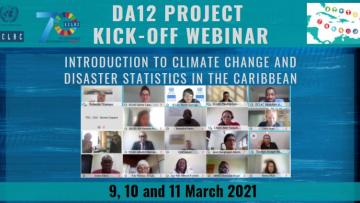Background
Compared to other regions of the world, Latin America and the Caribbean has historically made a minor contribution to climate change. Nonetheless, the region is acutely vulnerable to its negative consequences, particularly the small island developing States (SIDS) of the Caribbean that have been continuously impacted by hazardous events, such as tropical storms, floods or landslides.
So far, global focus on measuring GHG emissions has not provided much support to better measure climate change occurrences, impacts (including damages and losses), and adaptation indicators, which remain the most relevant issues for the Caribbean. The “Caribbean relevant climate change and disasters indicators for evidence-based sustainable development policies” project is focused on disaster statistics and incorporates Covid-19-related data and statistics as a natural component. The slow paces of development of new statistical methodologies, and the challenges with timeliness and quality of data among Caribbean countries, hamper the production and use of relevant indicators in informing policy decisions and actions that are aimed at addressing climate change and disaster vulnerability and building resilience. Institutionalizing sound evidence-based sustainable development policies in the Caribbean requires quality, timely, and accessible climate change and disasters indicators that are harmonized and comparable across countries.
As embodied in the “Caribbean First” strategy of the Economic Commission for Latin America and the Caribbean (ECLAC) and articulated by its Executive Secretary on many occasions, the Caribbean subregion is a priority in ECLAC’s programme of work. Given the statistical capacity challenges of most Caribbean countries, ECLAC (Division of Statistics and Caribbean Subregional Headquarters) is launching this new project (2021-2023) with a focus on supporting capacity building of the national statistical systems of non-Spanish-speaking Caribbean countries to institutionalize climate change and disaster-related data collection and indicators production. Building on the current work already undertaken by important stakeholders of the region, such as the CARICOM and the United Nations Statistics Division, the project will also aim at enhancing the capacity of policy makers to use these indicators for more effective climate change and disaster risk reduction actions, thereby contributing to the coherent implementation and monitoring of the Sustainable Development Goals, the Paris Agreement, the Sendai Framework for Disaster Risk Reduction, the SIDS Accelerated Modalities Of Action (SAMOA) Pathway and other international agreements.
Objectives of the kickoff webinar
- To further the understanding of the opportunities and challenges related to climate change and disasters indicators production in the Caribbean
- To showcase the latest available evidence on measuring climate change (drivers, occurrence, impacts, vulnerability, mitigation and adaptation) and disasters in the Caribbean
- To explore the links between statistical production and policymaking related to climate change adaptation and resilience
- To take stock of current initiatives to improve climate change and disaster statistics and indicators production in the Caribbean
Target audience
The webinar targets project’s focal points from National Statistical Offices, Disaster Risk Reduction/Management authorities and the Environment and Climate Change Ministries from non-Spanish speaking Caribbean countries (Member States and associates).
Representatives from regional, international organizations and the UN system are also invited.
Additionally, other stakeholders such as representatives of sectoral authorities and Ministries are welcome to join (i.e. health, water, forest, fisheries/aquaculture, coastal/seas, tourism, agriculture, meteorology authorities, as well as universities, research centers and other stakeholders related to the production and use of climate change and disaster indicators and their underlying statistics).
Connection details and hours
A Webex link will be sent to the participants, once they confirm attendance.
Time Zone
UTC-6: Belize
08:00-11:00
UTC-5: Bahamas, Cayman Islands, Haiti, Jamaica, New York, Turks and Caicos Islands
09:00-12.00
UTC -4: Anguilla, Antigua and Barbuda, Aruba, Barbados, Bermuda, British Virgin Islands, Curaçao, Dominica, Grenada, Guadeloupe, Guyana, Martinique, Montserrat, Saint Kitts and Nevis, Saint Lucia, Saint Martin, Saint Vincent and the Grenadines, Trinidad and Tobago
10:00-13:00
UTC -3: Santiago, Suriname
11:00-14:00
-----------------------------------------------------------------------------------------------------------------------------------------------------------------------------------------------------
Day 1
Tuesday 9 March 2021
"Taking stock of the regional and national situation, demand and supply of environment, climate change and disaster statistics"
Click HERE to access the full recording of the webinar - DAY 1
Day 2
Wednesday 10 March 2021
"Concepts, methods, classifications and international demand for climate change and disaster statistics production and indicators examples"
Click HERE to access the full recording of the webinar - DAY 2
Day 3
Thursday 11 March 2021
"Assessing opportunities and challenges to climate change and disaster statistics production in the Caribbean"
Click HERE to access the full recording of the webinar - DAY 3
Agenda click HERE
Presentations click HERE
Programa
